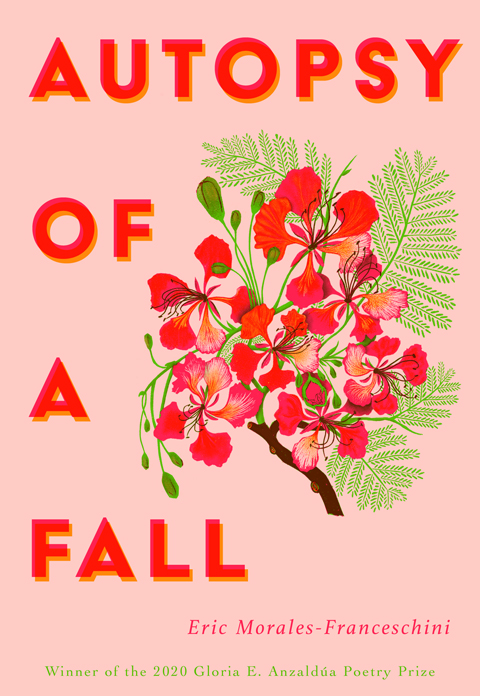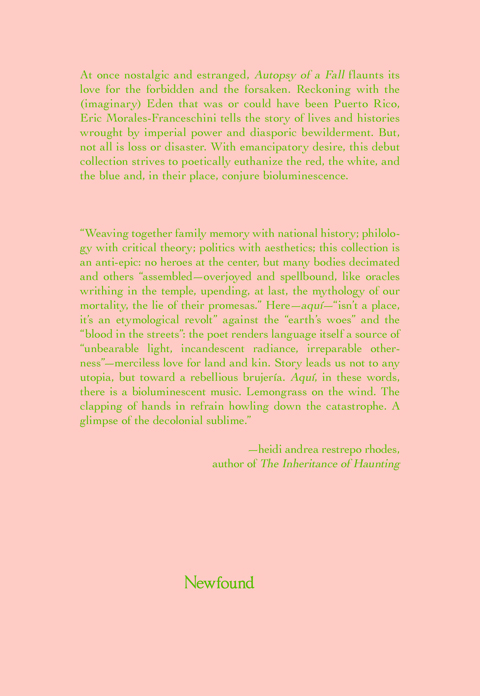Autopsy of a Fall • E-book
Summary
~ In honor of Gloria Anzaldúa, all author proceeds will go to la Colectiva Feminista in Puerto Rico and the Undocupoets Fund ~
At once nostalgic and estranged, Autopsy of a Fall flaunts its love for the forbidden and the forsaken. Reckoning with the (imaginary) Eden that was or could have been Puerto Rico, Éric Morales-Franceschini tells the story of lives and histories wrought by imperial power and diasporic bewilderment. But, not all is loss or disaster. With emancipatory desire, this debut collection strives to poetically euthanize the red, the white, and the blue and, in their place, conjure bioluminescence.
Details
- Winner of the 2020 Anzaldúa Poetry Prize
- Saddle-stitched, risograph cover, 48 pages, 5″ x 7.25″, FSC-certified paper
- Purchase allows three interactive PDF or EPUB downloads
- Order print + e-book
- Order print book only
Praise
“Weaving together family memory with national history; philology with critical theory; politics with aesthetics; this collection is an anti-epic: no heroes at the center, but many bodies decimated and others ‘assembled—overjoyed and spellbound, like oracles writhing in the temple, upending, at last, the mythology of our mortality, the lie of their promesas.’ Here—aquí—’isn’t a place, it’s an etymological revolt’ against the ‘earth’s woes’ and the ‘blood in the streets’: the poet renders language itself a source of “unbearable light, incandescent radiance, irreparable otherness”—merciless love for land and kin. Story leads us not to any utopia, but toward a rebellious brujería. Aquí, in these words, there is a bioluminescent music. Lemongrass on the wind. The clapping of hands in refrain howling down the catastrophe. A glimpse of the decolonial sublime.”
—heidi andrea restrepo rhodes, author of The Inheritance of Haunting
“Éric Morales-Franceschini’s Autopsy for a Fall is a global, decolonial ‘anti-epic’ nested in a diasporic ode to “this little isla and its debts,” across generations and geographies. From the crucible of Boricua life in the Deep South, Morales-Franceschini fashions what Gloria Anzaldúa would call an autohistoria-teoría, a personal history that theorizes: whether about the coloniality of our given names, the hidden meanings of commonwealth, or the buried knowledges of Afro-indigenous land. In the spirit of Frantz Fanon, Autopsy for a Fall maps the colonial subject’s ‘irreparable otherness,’ yet in the spirit of Pedro Pietri, it also insists that ‘all of it must be loved mercilessly’ (even if sometimes as ‘abyss’ and against ‘the fetishism of the tropics’). While reckoning with whiteness and the necropolitics of empire (1898 as now), Morales-Franceschini claims for blackness a revolutionary ‘New World ethics, like a lover’s discourse,’ at the limits of translation. These lyrically precise poems perform ‘a visceral phenomenological account’ in protean form, by turns occupying the page with a barrage of bullet points and gleaming like dinoflagellates in Puerto Rico’s occupied bays (‘i want to become bioluminescent’). Through it all, Autopsy for a Fall auscultates the sound of sovereignty in the syncopation of our breaths: ‘this isn’t / juridical, it’s exaltations, a book of sighs / waiting to be read aloud.’”
—Urayoán Noel, author of Transversal
Author
Caribeño writer and anti-disciplinary scholar Éric Morales-Franceschini works in decolonial studies, liberation theology, radical political economy, and mythopoetics of history. His poetry is in Kweli, Acentos Review, Moko, and elsewhere. Born in Puerto Rico and raised in southern Florida, he is a former day laborer, community college grad, and Army veteran who holds a Ph.D. from UC Berkeley and is Assistant Professor of English and Latin American Studies at the University of Georgia.
Artwork
Cover by LK James.
$2.99







